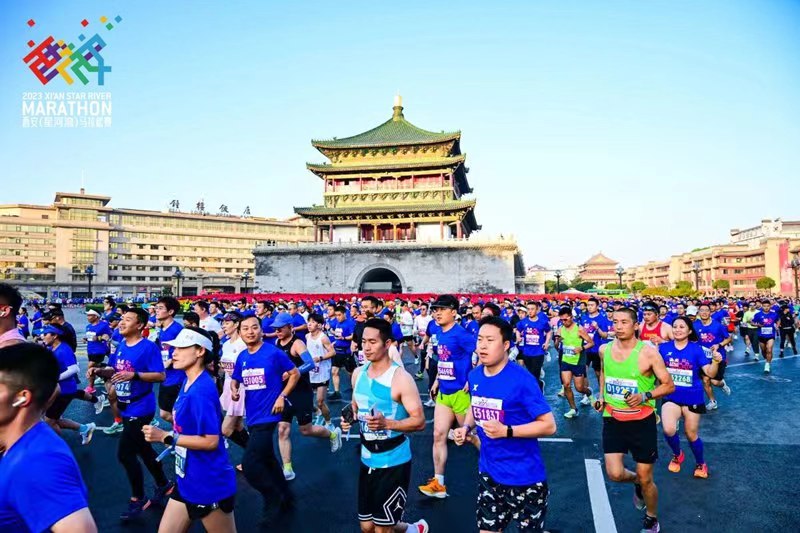The Booming Marathon Industry in China: Growth and Opportunities
The 2023 Xi’an Marathon. (Photo courtesy of the organizing committee of the Xi’an Marathon)
Over the past decade, the marathon industry in China has undergone remarkable transformation and expansion, destined to integrate itself with various sectors such as culture, tourism, health, and technology. This noteworthy progress was highlighted at the recent sports seminar organized by World Athletics and Mass Participation World, taking place on January 18, 2024. Marathon events operators and enthusiasts from around the globe noted the increasing popularity of road running as a vital sport in today’s society.
Elisabet Olival, a sports tourism expert from Kamel Turismo in Brazil, pointed out that sports-related travel packages—including eco and heritage tourism—comprised 57 percent of all travel options in 2023. She emphasized the rising trend of running worldwide, positioning it as a key growth area for tourism. This trend is particularly pronounced in China, where the large population and burgeoning interest in marathons have sparked explosive growth in the number of events held.
According to statistics, China hosted an impressive 580 road running events in 2023, with 308 of these certified by the China Athletics Association. Weihong Tang, chairperson of People’s Daily Online’s Supervisory Board, described this considerable growth in terms of “quantity” and “speed.” Sign-ups for prominent marathons in China frequently exceeded available spots, leading to record-breaking registrations. The 2023 Guangzhou Marathon, with a designed capacity of 30,000 runners, attracted over 140,000 registrants, while the Shanghai Marathon saw over 170,000 eager participants.
In terms of performance, the year 2023 witnessed exceptional achievements within the Chinese marathon community. For instance, Yang Shaohui established a new national record with a time of 2 hours, 7 minutes, and 9 seconds at the Fukuoka Marathon. Furthermore, the 2023 Beijing Marathon saw an unprecedented 2,402 runners complete the race in under three hours, indicating increased competitiveness among local runners aiming for marathon success.
Beyond individual achievements, the development of China’s high-speed rail network has significantly impacted marathon participation. With an extensive rail system covering 159,000 kilometers—of which 45,000 kilometers are high-speed—it has enhanced transportation accessibility. Tang shared her experience, highlighting how easy it has become for participants from various cities to travel for races. The rise of high-speed trains has simplified logistics, allowing many individuals to balance their professional lives alongside marathon racing.
Further analysis reveals that the flourishing marathon culture in China correlates strongly with economic growth. For instance, during the 2023 Chongqing Marathon, surrounding retail consumption reached 690 million yuan, providing a substantial boost to local tourism worth 300 million yuan. The report on the industry’s development anticipates that by 2025, the number of domestic road running events will increase to 2,500, with mass marathon participants expected to reach 10 million. This growth could elevate the event economy’s scale to an impressive 50 billion yuan, while the associated marathon derivative economy could surpass 400 billion yuan.
Marathons in China are not merely competitive events; they serve as a celebration of the country’s rich cultural heritage. Race routes are carefully chosen to showcase the unique history and characteristics of each city, making them enticing for both local and international runners. Running enthusiasts often say, “Run a marathon and fall in love with a city,” capturing the essence of marathon participation as an exploration of urban culture. There is growing support for strengthening international cooperation through these race events, as Tang suggested, using marathons as a bridge for increased global exchange.
In conclusion, China’s marathon industry is thriving as a significant component of both sports and tourism. It reflects societal values and offers vast opportunities for economic development while fostering cultural exchanges. As the marathon landscape expands, it will undoubtedly play a crucial role in the country’s growth trajectory in the coming years.

Weihong Tang (7th from right) at the 2022 Beijing Marathon. (Photo provided to People’s Daily Online)
For further insights into the development of this burgeoning industry, you can explore the High-quality Development Report of Road Race in China.
